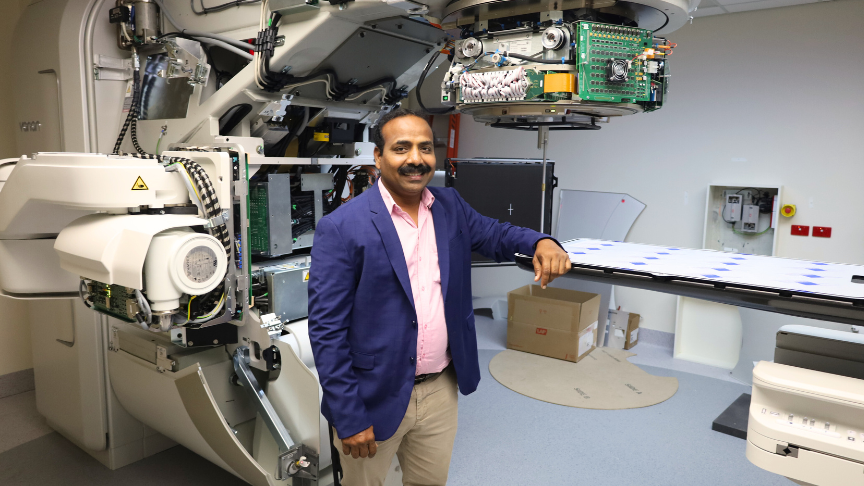
The medical physicists at Metro South Health welcome a new state-of-the-art TrueBeam radiotherapy system at Radiation Oncology Princess Alexandra Hospital Ipswich Road (ROPAIR). Designed with human care at its core, this technology is set to elevate cancer treatment.
Leading the charge on the set-up and commissioning of the machine is Prof. Prabhakar Ramachandran, Director of Medical Physics at ROPAIR, bringing with him over 28 years of experience as a Medical Physicist.
"We are very excited about the TrueBeam linear accelerators being installed, marking a significant milestone for our radiation oncology department," said Prof. Ramachandran.
“The precision and accuracy offered by this machine allow for better treatment of more complex and challenging cases, such as lung or liver tumours that move with each breath of the patient.”
“To be part of the journey to integrate this technology into our treatment workflow has been a really rewarding experience, especially for all the opportunities this new device offers to patients and clinicians.”
But it’s not just the machines that are driving this transformation, it’s the expert team of medical physicists behind the scenes. Working closely with radiation oncologists, radiation therapists, nurses, and engineers, this collaborative group of professionals ensures that every dose of radiation is delivered with precision, safety, and efficiency.
“The commissioning of a new machine is a true collaborative effort between everyone involved in the radiation oncology department. We want the patient to come in for treatment and everything to work perfectly for them and the clinician, while maintaining the safety of everyone in and outside the room.”
“We are very fortunate to have a great team that works very successfully together to ensure the system is up and running.”
Prof Ramachandran is also involved in cutting-edge research with AI-powered projects aimed at improving cancer treatment outcomes.
“These AI research projects are pivotal in increasing the positive outcomes for our patients,”
“We’re truly at the forefront of medical innovation, and it’s incredibly rewarding to see the tangible impact of our work.”
Working in partnership and supervising research groups at Queensland University of Technology, the University of Queensland, the Translational Research Institute, the University of Sydney, RMIT University and Anna University, his research groups have explored the auto-segmentation of tumour volumes, secondary cancer incidence, radiomic-based treatment outcomes, creation of synthetic CT scans, tumour tracking and predicting the formation of new brain metastases to name a few.
Over the years, Prof. Ramachandran has mentored more than 50 students, including postgraduates and PhD candidates, playing a key role in shaping the next generation of researchers in the field. Recently, one of his postgraduate students, Benjamin Shields earned the prestigious 2024 Kenneth Clark Award for their groundbreaking paper on deep learning in patient anatomy generation.
“I’m delighted that our research was recognised in such a way. It is great motivation to continue to research in this field.”
“The approach we examined in the paper has great potential to enhance radiotherapy patient setup and improve treatment quality for radiotherapy patients.”
With Prof. Ramachandran as one of the faces behind the bunker walls, a blend of state-of-the-art technology, research, and unwavering dedication, the future of cancer treatment is more optimistic than ever.